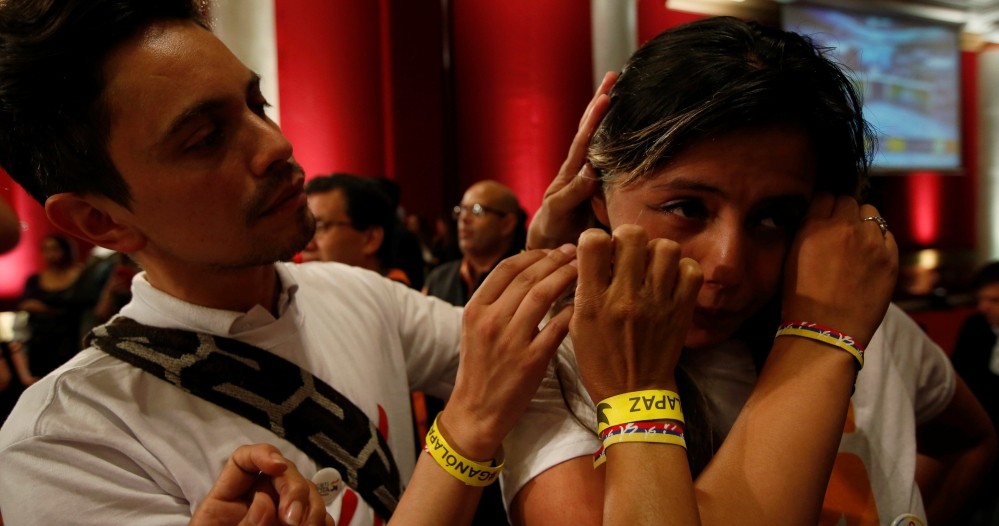PHOTO: A Yes supporter in Colombia’s October referendum cries after narrow rejection of the Government-FARC peace deal
Adam Quinn, of the University of Birmingham and Political WorldView, writes for the Birmingham Perspective:
See also EA’s Political WorldView Podcast: Inward-Looking Tories, Colombia, and Referendums Edition
The referendum, as an instrument of political decision-making, has been the source of much consternation in 2016. First, June saw an unexpected British vote to leave the European Union. Then, in October, Colombians shocked the world as the narrowest of majorities, 50.2% on a 38% turnout, voted to reject a peace deal negotiated between the government and the leftist guerrillas of the FARC to end its 52-year civil conflict.
Included among those shocked was, apparently, the Nobel Peace Prize committee, which had prematurely rewarded Colombian President Juan Manuel Santos with its 2016 prize. The same day, a referendum in Hungary produced a 98% vote to reject the authority of the EU to mandate settlement of refugees in the country. The turnout was below that required to make the result legally valid, but the government made it clear it would be taking the result as a mandate for action nevertheless.
Such episodes served to highlight both the seductive attraction and grave perils of referendums for those who decide to hold them. There are three primary reasons why one might consider referendums a good idea. First is their intrinsic worth as an exercise in direct democracy. Referendum campaigns engage national publics, often passive and sometimes actively excluded, in the business of political debate and decision-making. Those who see virtue in the idea of a more direct link between the popular will and the levers of power therefore admire them as an instrument of empowerment for the too-often neglected people.
Second, in the cases of difficult negotiations over a peace settlement in societies afflicted by years of civil conflict, the prospect of a popular vote on the final deal concentrates the minds of those negotiating on coming up proposals that can be politically sustained. The ultimate role of the whole population in deciding whether the deal sticks can be important in prodding elites, otherwise comfortable and secure in their factional power, to do the harder work of engaging with the bigger political picture.
Third, a referendum may be useful to ensure a broad base of political support for a controversial decision, and “lock in” a choice that will necessitate riding out unpopular consequences during the implementation. If concessions need to be made to those who committed crimes during a conflict, or if a course will impose severe economic costs, or if a divisive point principle is at issue, endorsement by direct popular vote will likely aid political stability, and also bind not just the present government, but those that follow it.
On the other hand, there are two very stark downsides to choosing a referendum as the way to resolve an issue. The first is that a referendum campaign opens the space for actors on either side to portray the choice between the status quo and the proposed change as a false one, and to seduce voters with false promises based on fantasies of what ideal outcome might be delivered as an alternative if voters reject the course elites like party leaders have recommended. A core purpose of referendums is to engage those with relatively low information about the issues, which is to say the general population, in the choice. This makes them especially vulnerable to producing decisions based on false information and/or unrealistic beliefs about what alternatives are possible – often stoked by opportunistic actors within the political system.
The second downside is that referendum campaigns themselves can be savagely divisive, especially when the prospect of a narrow victory tempts campaigners to use every argument at their disposal. Political division in both the UK and Colombia has been markedly intensified by the 2016 campaigns there. The Australian government is presently considering a ‘plebiscite’ on the issue of marriage equality even though a clear majority in favour exists in parliament; many are strongly opposed on the grounds that such a campaign would be socially divisive, and might even provide a platform that legitimises hate speech.
Above all, the key principle of referendums for any government is this: if you call one, you had better be certain you are going to win. Because if you don’t, the political costs for both the leaders responsible and the country at large are often vast.

